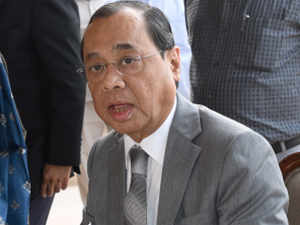
He was speaking on “Cooperative Federalism and Judiciary” at a webinar organised by the Bennett University School of Law.
The former CJI conceded that there were limits to the Supreme Court’s power to intervene in any case. Courts will not normally interfere with or advice on economic policy. The court should also not be the first recourse to diffuse stress and strains, he said.
Rather it must allow the administrative and executive authorities sufficient time to discharge their responsibilities. It is only when the instrumentalities fail or refuse to step in that the court will intervene to ensure accountability and preserve rule of law, he said.
Lok Sabha Elections#Elections With 
- All
- Uttar Pradesh
- Maharashtra
- Tamil Nadu
- West Bengal
- Bihar
- Karnataka
- Andhra Pradesh
- Telangana
- Kerala
- Madhya Pradesh
- Rajasthan
- Delhi
- Other States
That is best left to the wisdom of the judges dealing with a case, the former CJI said. He shrugged off criticism over the top court’s refusal to address the human crisis i.e. migration from cities to rural areas during the lockdown as unjustified.
The court’s refusal to step in is being compared with the role of the judiciary during Emergency, he said. “The two situations are incomparable. Emergency was all about constitutional perversions conceived by human imagination…. The current situation is beyond human comprehension.”
He said that honest, well-founded criticism of judges would only make the institution more robust but attributing ill will to individual judges will only weaken the judiciary and the nation in the long run. Unprecedented situations need unprecedented responses, especially in a crisis such as the pandemic, he said.
The courts in such situations must ensure that executive action doesn’t take away the basic rights and liberties of citizens. As the course corrector, and the constitutional interpreter the courts must even though they lack the time to deliberate and discuss step up to ensure that individual liberties are protected.
Time is not a luxury the courts can have during a pandemic, he said. In normal times, the court must step back to allow the government to function through consensus and consultation based solutions.
He said that the concept of cooperative federalism must also apply to the Supreme Court and the High Courts. High Courts must not deal with issues pending with the top court unless they involve local issues, he said. Otherwise they run the risk of becoming two disjunct entities, he said.
Read More News on
Download The Economic Times News App to get Daily Market Updates & Live Business News.
Subscribe to The Economic Times Prime and read the ET ePaper online.
Read More News on
Download The Economic Times News App to get Daily Market Updates & Live Business News.
Subscribe to The Economic Times Prime and read the ET ePaper online.













 Get Unlimited Access to The Economic Times
Get Unlimited Access to The Economic Times
